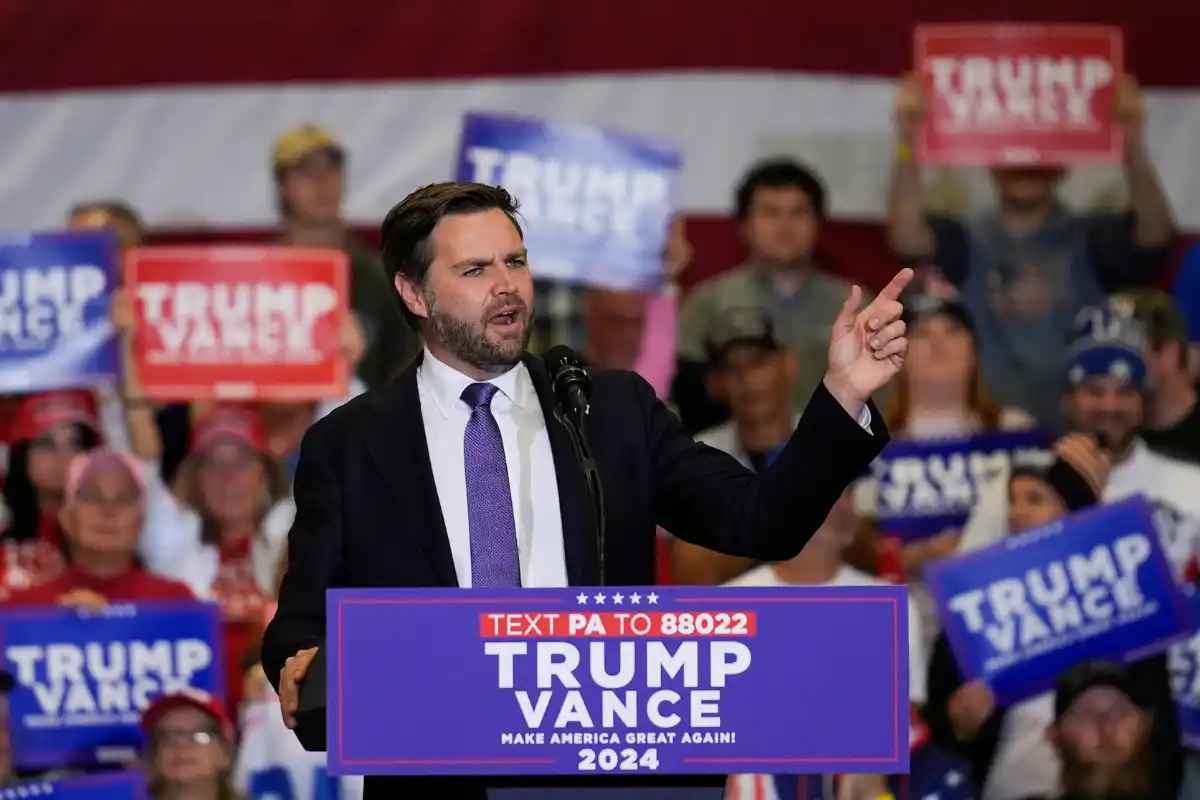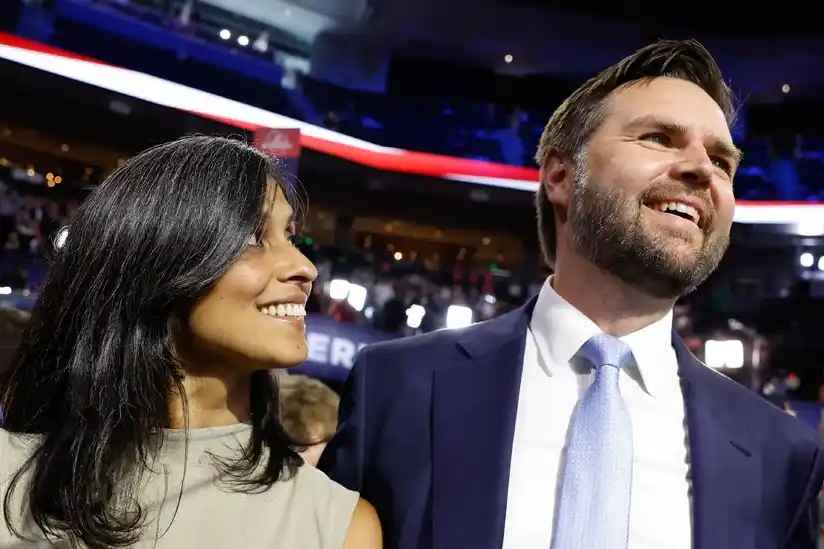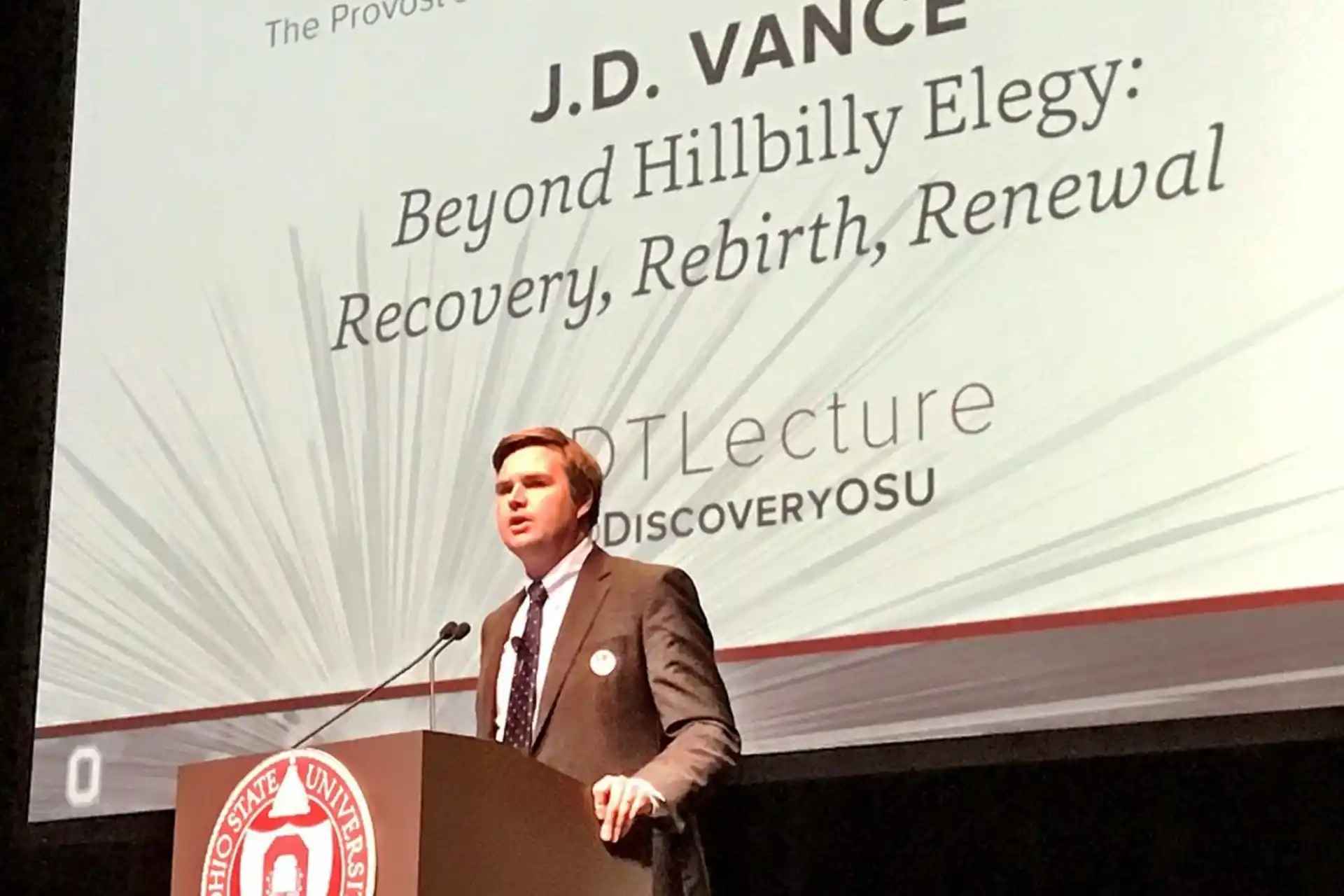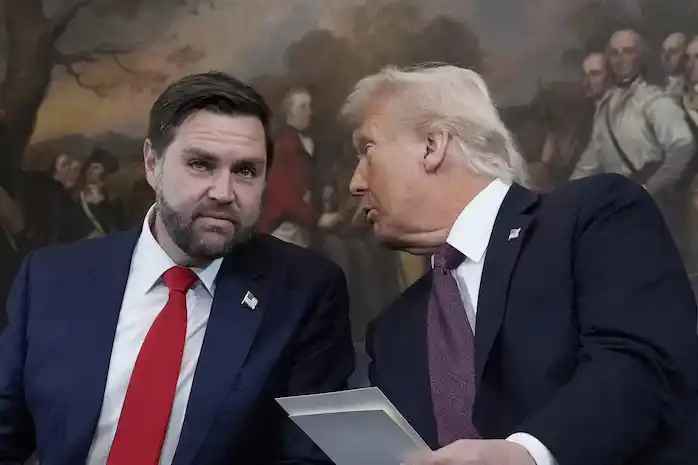J.D. Vance: From Hillbilly Elegy to Vice President of the United States
Updated on : 21 January, 2025

Image Source: news18.com
Introduction
J.D. Vance, born James David Vance on August 2, 1984, in Middletown, Ohio, is a significant figure in American politics and literature. He is most renowned for his bestselling memoir, Hillbilly Elegy, which delves into the challenges faced by the white working class in America, particularly in Appalachia. His observations on these cultural dynamics have resonated widely, especially during a period marked by increasing political polarization.
Vance's life story reflects a remarkable journey from a difficult upbringing to becoming a U.S. Senator and later the Vice President of the United States. His experiences and insights into the struggles of his community are central themes in his writing, showcasing his deep connection to the issues he addresses. His ascent to political prominence illustrates not only his personal resilience but also highlights the broader socio-economic challenges faced by many Americans today.
Usha Vance: A Key Influence in J.D. Vance's Journey

Image Source: bbci.co.uk
Usha Chilukuri Vance, born on January 6, 1986, in San Diego, California, is an influential figure in American law and politics, notably as the wife of Vice President-elect J.D. Vance. Raised by Indian immigrant parents, her father was a mechanical engineer and her mother a molecular biologist, which provided her with an upper-middle-class upbringing that emphasized the importance of education and achievement.
Role in J.D. Vance's Political Ascent
As J.D. Vance's political career progressed, Usha became a pivotal influence in his life, often referred to as his "spirit guide." She provided emotional support and practical advice throughout his journey from author to U.S. Senator and now Vice President-elect. Usha played a crucial role in his campaign efforts, including delivering the introductory address at the 2024 Republican National Convention.
As of January 20, 2025, she will assume the role of Second Lady of the United States, making history as the first Indian-American to hold this title. Usha’s background and accomplishments reflect her significant impact on both her husband's career and the broader cultural landscape of American politics.
Education of Usha Vance
Usha graduated summa cum laude from Yale University with a degree in history and later earned her Juris Doctor from Yale Law School in 2013. During her time at Yale, she excelled academically and held leadership roles, including serving as Managing Editor of the Yale Journal on Law & Technology and Executive Development Editor of The Yale Law Journal.
Meeting J.D. Vance
Usha met J.D. Vance at Yale Law School, where their friendship blossomed into a deeper relationship through shared academic interests and collaborative projects. In his memoir, Hillbilly Elegy, Vance credits Usha with helping him navigate the challenges of attending an elite institution by providing guidance on social etiquette and cultural nuances.
Career
After law school, Usha clerked for notable judges, including Chief Justice John Roberts and Justice Brett Kavanaugh. She worked at a prestigious law firm handling civil litigation and appeals for high-profile clients until she resigned in July 2024 to focus on family and support her husband’s political career.
Early Life and Background of J.D. Vance
J.D. Vance's early life was characterized by instability and hardship. Born as James Donald Bowman on August 2, 1984, in Middletown, Ohio, he faced significant challenges from a young age. His parents divorced when he was a toddler, and his mother, Beverly, struggled with addiction and financial difficulties. This tumultuous environment led him to find solace and guidance from his maternal grandparents, particularly his grandmother, whom he affectionately refers to as "Mamaw."
Vance's grandparents played a crucial role in his upbringing, providing him with the support and stability he needed during his formative years. They had relocated to Middletown from the Appalachian region of eastern Kentucky, which deeply influenced Vance's perspectives and values. His experiences in this challenging environment would later inform his writing and political views, particularly in his bestselling memoir, Hillbilly Elegy, where he articulates the struggles of the working-class communities in America.
After graduating from Middletown High School in 2003, Vance enlisted in the U.S. Marine Corps, serving as a combat correspondent during the Iraq War. This military service further shaped his character and sense of duty, ultimately leading him to pursue higher education at Ohio State University and later at Yale Law School. His journey from a difficult childhood to achieving success illustrates resilience and the impact of familial support on personal development.
Popular Blogs
Military Service
J.D. Vance enlisted in the United States Marine Corps in 2003, serving until 2007. His military career included a six-month deployment to Iraq as a public affairs officer, where he earned several commendations for his service, including the Marine Corps Good Conduct Medal, Navy and Marine Corps Achievement Medal, and the Iraq Campaign Medal.

Image Source: cnn.com
This experience not only instilled a sense of discipline in Vance but also provided him with a unique perspective on American life and values. He described his role as a military journalist, which involved crafting narratives about military operations and engaging with the media, allowing him to witness firsthand the complexities of military life and its impact on service members.
Vance's time in Iraq was particularly formative; he recounted moments that highlighted the challenges faced by soldiers and the importance of their mission. His military service has been a significant aspect of his identity, influencing his views and shaping his political career as he transitioned from military life to academia and eventually into politics.
Education

Image Source: google.com
Ohio State University
After completing his military service, J.D. Vance utilized the GI Bill to attend Ohio State University, where he graduated in 2009 with a degree in political science and philosophy. His time at Ohio State was formative, allowing him to engage with diverse ideas and perspectives, which helped shape his understanding of American society and politics. Vance's connection to Ohio State remains significant; he has returned to the university multiple times to speak about his experiences and the themes explored in his memoir, Hillbilly Elegy.
Yale Law School
Following his undergraduate studies, Vance attended Yale Law School, where he further honed his analytical skills and understanding of law and policy. He graduated with a Juris Doctor degree in 2013. It was during this pivotal period that he met his future wife, Usha Chilukuri, who would become a key influence in his life and career. At Yale, Vance distinguished himself academically and was encouraged by faculty to write about his upbringing, leading to the publication of Hillbilly Elegy in 2016.
Early Career
Legal Career
Upon graduating from Yale Law School in 2013, J.D. Vance began his legal career at the prestigious law firm Sidley Austin. This role provided him with critical legal experience and insights into the judicial system and business operations. Vance's work in private practice allowed him to develop a strong foundation in regulatory frameworks, which would later inform his understanding of public policy and governance.
Venture Capital
After his time in law, Vance transitioned into venture capital, working as a principal at Mithril Capital, a firm co-founded by Peter Thiel. His venture capital work focused on investing in startups across the Midwest, aiming to revitalize the region's economy and create opportunities for local communities. This experience not only expanded his understanding of business and innovation but also reinforced his commitment to addressing the economic challenges faced by the Rust Belt, themes he later explored in his writing and political career.
Hillbilly Elegy: The Memoir

Image Source: vanityfair.com
Themes and Reception
Published in 2016, Hillbilly Elegy quickly became a bestseller, sparking national conversations about class, culture, and identity in America. The memoir delves into significant themes such as loyalty, family dynamics, and the socio-economic challenges faced by working-class Americans. Vance's narrative reflects on his upbringing amid poverty and addiction, particularly highlighting the influence of his grandparents, whom he credits with instilling essential values in him. The book emphasizes the complexities of upward mobility and personal agency, portraying economic success as both possible and deeply complicated, contingent on individual determination and available opportunities.
The reception of Hillbilly Elegy has been mixed; while it has garnered praise for its candid storytelling and insights into the Appalachian experience, critics have raised concerns about its portrayal of poverty and the implications of Vance's arguments regarding personal responsibility versus systemic issues. With nearly 96,000 reviews and an average rating of 4.3/5 on platforms like Amazon, the memoir resonates with many readers who find value in its exploration of resilience and the importance of education as a pathway out of hardship.
Adaptation into Film
In 2020, Hillbilly Elegy was adapted into a film directed by Ron Howard, further amplifying Vance's narrative and its implications for understanding American society. The film features notable performances from actors such as Glenn Close and Amy Adams, portraying key figures in Vance's life. While the adaptation aimed to bring Vance's story to a broader audience, it also sparked discussions about the accuracy of its representation compared to the memoir, highlighting the ongoing debate over cultural identity and socio-economic issues in America. The film's release contributed to renewed interest in Vance's work, reinforcing its impact on contemporary discussions surrounding class and culture.
Political Career
U.S. Senate Election
J.D. Vance entered politics with a successful campaign for the U.S. Senate in Ohio during the 2022 election, where he defeated Democratic candidate Tim Ryan by a margin of 6.1 percentage points. Vance garnered significant support from former President Donald Trump, who endorsed him and campaigned on his behalf, despite Vance's earlier criticisms of Trump. This backing was pivotal, as Vance and Trump effectively linked Ryan to the national economic challenges attributed to the Biden administration, which resonated with Ohio voters.
Vance's victory was seen as a blow to Democrats, who viewed Ohio as a potential seat to flip in the Senate. His win marked a shift in Ohio's political landscape, as he succeeded retiring Republican Senator Rob Portman. In his victory speech, Vance expressed gratitude and committed to fighting for the people of Ohio, emphasizing his dedication to addressing their concerns.
Political Positions
As a senator, Vance has been vocal about several key issues, including:
- Immigration Reform: Advocating for stricter immigration policies.
- Economic Revitalization: Focusing on initiatives aimed at supporting working-class families and revitalizing the Midwest economy.
- Skepticism Towards Foreign Aid: Expressing doubts about the effectiveness and necessity of U.S. foreign aid policies.
Vance has positioned himself within the national conservative movement and has been characterized as a right-wing populist. His political positions reflect a blend of traditional Republican values with a focus on addressing the concerns of his constituents in Ohio.
Vice Presidential Nomination
In 2024, J.D. Vance was selected as Donald Trump's running mate for the presidential election, marking a significant moment in his political career. Their campaign focused on themes of nationalism and populism, resonating with many voters who felt disillusioned by traditional political establishments. Vance's selection was announced on July 15, 2024, during the Republican National Convention, where he accepted the nomination shortly thereafter.
Vance's rise to the vice presidency reflects a broader trend within the Republican Party, emphasizing a shift towards a younger generation of leaders. At 40 years old, Vance will be the third-youngest vice president in U.S. history and the first to be born in the Millennial generation. His journey from a Trump skeptic to a key ally illustrates the former president's influence on reshaping the GOP narrative and voter base.
Throughout the campaign, Vance maintained a focus on issues such as economic revitalization, immigration reform, and skepticism towards foreign aid policies, aligning closely with Trump's platform. The duo's approach attracted significant support, particularly among voters seeking alternatives to established political norms. As Vance prepares to take office, his role will likely be pivotal in shaping the administration's policies and direction moving forward.
Personal Life

Image Source: wp.com
Family and Marriage
J.D. Vance married Usha Chilukuri during their time at Yale Law School. Together, they are proud parents of three children: Ewan, aged 7; Vivek, aged 4; and Mirabel, aged 2. The Vance family resides in Cincinnati, Ohio, and their family life reflects a commitment to traditional values amidst the challenges of modern society. Vance has expressed a desire for families to have more children, highlighting his dedication to family and community .

Image Source: twimg.com
Influence of Catholic Theology
Vance's upbringing in the Catholic faith has significantly influenced his worldview, shaping his perspectives on morality, community responsibility, and personal accountability. His Catholic background informs many of his political positions and personal beliefs, emphasizing the importance of faith and values in guiding ethical decision-making . This influence is evident in his advocacy for issues that align with traditional Catholic teachings, such as opposition to abortion and a focus on family-oriented policies.
Public Perception and Criticism
Despite his political successes, J.D. Vance has faced significant criticism regarding his statements on social issues and perceived contradictions between his populist rhetoric and actual political actions.
Recent polling indicates a mixed public perception of Vance. As of mid-January 2025, his favorability ratings show that 43% of respondents view him favorably, while 48% hold an unfavorable opinion, reflecting a net negative rating in several polls conducted by sources like The Economist and Fox News. This unpopularity can be attributed to various factors, including his association with controversial policies like Project 2025, which outlines radical changes to the federal government and has drawn criticism from both sides of the political spectrum.
Vance's past statements, including comparisons of Trump to Hitler before he became a vocal supporter, have also been points of contention. Critics argue that his shift from being a Trump skeptic to a key ally raises questions about his authenticity and commitment to the values he once espoused. Furthermore, his attempts to distance himself from Project 2025 amid growing backlash suggest a struggle to reconcile his populist image with the more extreme elements of the agenda.
Key Policies and Legislative Focus
During his tenure in the Senate, J.D. Vance focused on several key policies and legislative initiatives, including:
-
Immigration Reform: Vance has advocated for stricter immigration policies, emphasizing the need for a more secure border and measures to reduce illegal immigration.
-
Economic Policies Aimed at Revitalizing Manufacturing: He has been a strong proponent of initiatives designed to boost American manufacturing, particularly in the Midwest, reflecting his commitment to restoring jobs and economic stability in working-class communities.
-
Opposition to Foreign Aid to Ukraine: Vance has expressed skepticism regarding U.S. foreign aid, particularly to Ukraine, arguing that resources should be prioritized for domestic needs rather than international commitments.
-
Support for Broadband Access Initiatives for Low-Income Families: He has championed efforts to improve broadband access for low-income families, recognizing the importance of connectivity in education and economic opportunities.
Future Aspirations

Image Source: business-standard.com
As Vice President under Donald Trump's administration starting January 2025, J.D. Vance aims to influence national policy on key issues affecting working-class Americans while navigating the complexities of partisan politics. His focus will likely include:
-
Economic Revitalization: Vance plans to advocate for policies that support manufacturing and job creation in the Midwest, reflecting his commitment to improving the economic conditions for working-class families.
-
Immigration Reform: He intends to push for stricter immigration policies, aligning with his previous stances during his Senate campaign.
-
Social Issues: Vance's positions on issues such as abortion and foreign aid will be closely scrutinized as he seeks to balance populist rhetoric with actionable policies.
Vance's role as Vice President positions him as a potential frontrunner for the 2028 presidential election, especially given Trump's inability to run again due to constitutional limitations. His incumbency may provide him with an advantage over other Republican candidates, supported by key figures within the party and the MAGA movement. As he embarks on this new chapter, Vance's ability to navigate partisan dynamics while advocating for his constituents will be critical in shaping his legacy and future aspirations in American politics.















